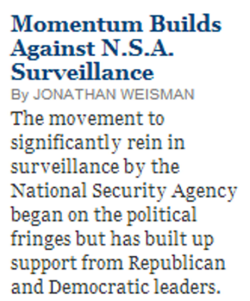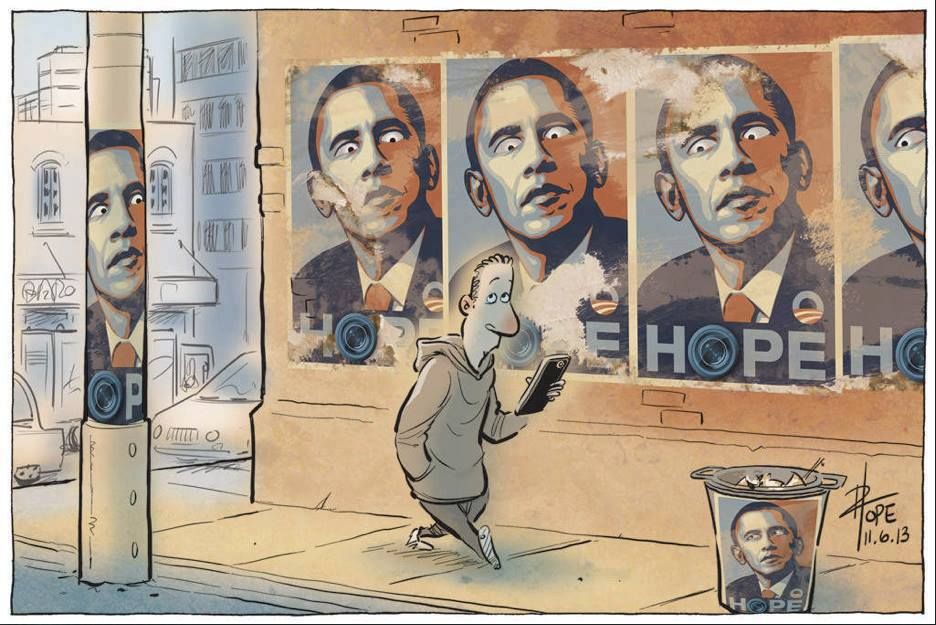Barack Obama: Well, in the end, and what I’ve said, and I continue to believe, is that we don’t have to sacrifice our freedom in order to achieve security. That’s a false choice. That doesn’t mean that there are not tradeoffs involved in any given program, in any given action that we take. So all of us make a decision that we go through a whole bunch of security at airports, which when we were growing up that wasn’t the case…. And so that’s a tradeoff we make, the same way we make a tradeoff about drunk driving. We say, “Occasionally there are going to be checkpoints. They may be intrusive.” To say there’s a tradeoff doesn’t mean somehow that we’ve abandoned freedom. I don’t think anybody says we’re no longer free because we have checkpoints at airports.
Charlie Rose: But there is a balance here.
Barack Obama: But there is a balance, so I’m going to get to your – get to your question. The way I view it, my job is both to protect the American people and to protect the American way of life, which includes our privacy. And so every program that we engage in, what I’ve said is “Let’s examine and make sure that we’re making the right tradeoffs.” Now, with respect to the NSA, a government agency that has been in the intelligence gathering business for a very long time –
Charlie Rose: Bigger and better than everybody else.
Barack Obama: Bigger and better than everybody else, and we should take pride in that because they’re extraordinary professionals; they are dedicated to keeping the American people safe. What I can say unequivocally is that if you are a U.S. person, the NSA cannot listen to your telephone calls, and the NSA cannot target your emails … and have not. They cannot and have not, by law and by rule, and unless they – and usually it wouldn’t be “they,” it’d be the FBI – go to a court, and obtain a warrant, and seek probable cause, the same way it’s always been, the same way when we were growing up and we were watching movies, you want to go set up a wiretap, you got to go to a judge, show probable cause….
So point number one, if you’re a U.S. person, then NSA is not listening to your phone calls and it’s not targeting your emails unless it’s getting an individualized court order. That’s the existing rule. There are two programs that were revealed by Mr. Snowden, allegedly, since there’s a criminal investigation taking place, and they caused all the ruckus. Program number one, called the 2015 Program, what that does is it gets data from the service providers like a Verizon in bulk, and basically you have call pairs. You have my telephone number connecting with your telephone number. There are no names. There is no content in that database. All it is, is the number pairs, when those calls took place, how long they took place. So that database is sitting there. Now, if the NSA through some other sources, maybe through the FBI, maybe through a tip that went to the CIA, maybe through the NYPD. Get a number that where there’s a reasonable, articulable suspicion that this might involve foreign terrorist activity related to Al-Qaeda and some other international terrorist actors. Then, what the NSA can do is it can query that database to see did any of the – did this number pop up? Did they make any other calls? And if they did, those calls will be spit out. A report will be produced. It will be turned over to the FBI. At no point is any content revealed because there’s no content that –
Charlie Rose: So I hear you saying, I have no problem with what NSA has been doing.
Barack Obama: Well, let me – let me finish, because I don’t. So, what happens is that the FBI – if, in fact, it now wants to get content; if, in fact, it wants to start tapping that phone – it’s got to go to the FISA court with probable cause and ask for a warrant.
Charlie Rose: But has FISA court turned down any request?
Barack Obama: The – because – the – first of all, Charlie, the number of requests are surprisingly small… number one. Number two, folks don’t go with a query unless they’ve got a pretty good suspicion.
Charlie Rose: Should this be transparent in some way?
Barack Obama: It is transparent. That’s why we set up the FISA court…. The whole point of my concern, before I was president – because some people say, “Well, you know, Obama was this raving liberal before. Now he’s, you know, Dick Cheney.” Dick Cheney sometimes says, “Yeah, you know? He took it all lock, stock, and barrel.” My concern has always been not that we shouldn’t do intelligence gathering to prevent terrorism, but rather are we setting up a system of checks and balances? So, on this telephone program, you’ve got a federal court with independent federal judges overseeing the entire program. And you’ve got Congress overseeing the program, not just the intelligence committee and not just the judiciary committee – but all of Congress had available to it before the last reauthorization exactly how this program works.
Now, one last point I want to make, because what you’ll hear is people say, “Okay, we have no evidence that it has been abused so far.” And they say, “Let’s even grant that Obama’s not abusing it, that all these processes – DOJ is examining it. It’s being renewed periodically, et cetera – the very fact that there is all this data in bulk, it has the enormous potential for abuse,” because they’ll say, you know, “You can – when you start looking at metadata, even if you don’t know the names, you can match it up, if there’s a call to an oncologist, and there’s a call to a lawyer, and – you can pair that up and figure out maybe this person’s dying, and they’re writing their will, and you can yield all this information.” All of that is true. Except for the fact that for the government, under the program right now, to do that, it would be illegal. We would not be allowed to do that.
Charlie Rose: So, what are you going to change? Are you going to issue any kind of instructions to the Director of National Intelligence, Mr. Clapper, and say, “I want you to change it at least in this way”?
Barack Obama: Here’s what we need to do. But before I say that – and I know that we’re running out of time, but I want to make sure I get very clear on this. Because there has been a lot of mis-information out there. There is a second program called the 702 program. And what that does is that does not apply to any U.S. person. Has to be a foreign entity. It can only be narrowly related to counter-terrorism, weapons proliferation, cyber hacking or attacks, and a select number of identifiers – phone numbers, emails, et cetera. Those – and the process has all been approved by the courts – you can send to providers – the Yahoos or the Googles, what have you. And in the same way that you present essentially a warrant. And what will happen then is that you there can obtain content. But again, that does not apply to U.S. persons. And it’s only in these very narrow bands. So, you asked, what should we do? …What I’ve said is – is that what is a legitimate concern – a legitimate critique – is that because these are classified programs – even though we have all these systems of checks and balances, Congress is overseeing it, federal courts are overseeing it – despite all that, the public may not fully know. And that can make the public kind of nervous, right? Because they say, “Well, Obama says it’s okay – or Congress says it’s okay. I don’t know who this judge is. I’m nervous about it.” What I’ve asked the intelligence community to do is see how much of this we can declassify without further compromising the program, number one. And they are in that process of doing so now so that everything that I’m describing to you today, people, the public, newspapers, etc., can look at because frankly, if people are making judgments just based on these slides that have been leaked, they’re not getting the complete story.
Number two. I’ve stood up a privacy and civil liberties oversight board, made up of independent citizens including some fierce civil libertarians. I’ll be meeting with them. And what I want to do is to set up and structure a national conversation, not only about these two programs, but also the general problem of data, big data sets, because this is not going to be restricted to government entities.
Charlie Rose: Let me just ask you this. If someone leaks all this information about NSA surveillance, as Mr. Snowden did…. Did it cause national security damage to the United States, and therefore, should he be prosecuted?
Barack Obama: I’m not going to comment on prosecution…. The case has been referred to the DOJ for criminal investigation… and possible extradition. I will leave it up to them to answer those questions.
Keep in mind that this president employs and supports two known liars, Director of National Intelligence James Clapper and National Security Agency Director Gen. Keith B. Alexander, both of whom have continuously lied to Congress about the surveillance programs. This president has approved unchecked wiretapping something he said he would end when campaigning for office.
So what does he believe? Certainly not the Constitution and our right to protection from illegal searches.


 You know you’ve screwed up when an agent from one of the most secretive and notorious spy agencies tells you so. A former lieutenant colonel in the now defunct East German secret police, the Stasi, Wolfgang Schmidt was “appalled” saying that
You know you’ve screwed up when an agent from one of the most secretive and notorious spy agencies tells you so. A former lieutenant colonel in the now defunct East German secret police, the Stasi, Wolfgang Schmidt was “appalled” saying that